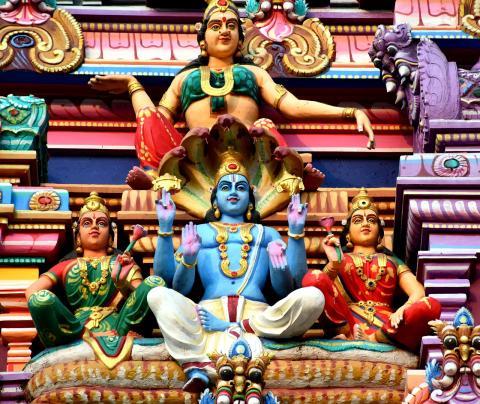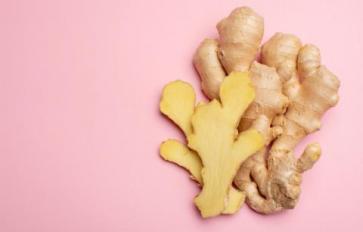
I stood atop the first Vishnu temple I’d ever encountered in India, in the south, in Madurai. Upon entering the temple I was greeted by a priest who offered me leaves of tulsi and a few sugar cubes as an offering. I soon made my way up to the roof of the temple, after peering into the sanctuary. Though the inside was where worshippers gathered to “see the divine,” it was on the roof where I first encountered what I would call “Vishnu Consciousness” in me. Dropping to my knees atop the temple overlooking the city, I felt an overwhelming sense of peace and harmony. I felt the words “I am Vishnu” as I slowly began to sob with the pervading peace and calm which saturated my cells. I finally understood the meaning of the word “Shanti” in that moment.
Story of Vishnu
The myths describe Brahma as the original impetus of creation, emerging from the navel of Vishnu, relaxed in an eternal yoga nidra—upholding the balance of the universe. So, where creation comes of action and a desire to experience form and relationship, Vishnu represents that aspect of us which is forever suspended as the cosmic overseer, the eternal eye in the midst of the creation and destruction storms of our lives.
At the time I visited the Vishnu temple in southern India, I had been immersed in some of the northern states which largely acknowledged the Shivite sects and worshipped Shiva as one of the main representations of the Divine. By association, and because it was easy to acquire a Shiva statue or item for my altar, I too had begun to familiarize myself with how Shiva showed up in my life as the great destroyer and rebuilder. However, I also began to notice that my life, too, was filled with much in the way of massive transformation and destruction of old patterns, the release of old friendships, and a loss of the identification with my previous self. Though these things were all wonderful, and served me well for a time, I was much relieved to contact the energy of Vishnu within, where I felt, for once, that I was able to preserve some peace and find still in an ever-changing reality.
Vishnu is that part of us which holds the line through it all. He is the silver thread connected to our navel while we astral travel and lucid dream. He is the quiet center we seek to reach in meditation, and the place we come back to within, when the world seems to be falling apart around us. Vishnu is our breath, but even more than this, he is the prana, the spirit which never dies and is eternal. When we contact Vishnu consciousness, we are accessing that which is Infinite and without beginning or end. When we relax into our personal truth, the part of us which never changes, but is forever still as the beholding eye, we are accessing Vishnu consciousness.
Ayurveda & Vishnu
In Ayurveda the three main doshas are described as Kapha (earth/water), Pitta (fire/water), and Vata (ether/air), where the three main qualities of experience are Sattvic (neutral), Rajasic (positive), or Tamasic (negative). In order to bring the various doshas into balance, or to note how they have fallen out of balance, it is usually indicated to notice the way one consumes or participates in the three main qualities of Sattva, Rajas, or Tamas. These three qualities also relate to the three main characters in the trifecta of creation (Vishnu, Brahma, and Shiva). Where Brahma is creation and Shiva is destruction, Vishnu equates to preservation, the neutral force which is most helpful in bringing the doshas back into balance.
By calling upon Vishnu within, we are accessing the quality of perfect health and homeostasis. Through contacting Vishnu-consciousness within we are activating the part of us which is capable of bringing balance and harmony into our lives.
In India, tulsi plants are kept in nearly every doorway, both to represent Vishnu—the preserver—and as the queen of the Ayurvedic plants, known to deter the demons and ward off disease. Some would say that tulsi is the consort of Vishnu; others say that Tulsi is a manifestation of Vishnu himself. Whatever way you look at it, the concept of health and longevity is associated with Lord Vishnu. Every person who consumes the tulsi plant is likewise accessing this state of wellbeing and the capacity for long life within.
Vishnu and Lakshmi
Lakshmi, goddess of fortune and wealth, is the generally agreed upon wife of Vishnu, pointing to the awareness that we are best able to access wealth when we are still, calm, and centered, at the zero point of our existence.
Avatars and Vishnu
Vishnu is also the aspect of the divine which is known to incarnate as an avatar whenever humanity is in dire need. Buddha and Krishna are both known incarnations of Vishnu. How this translates to me, in terms of finding Vishnu within, is the awareness that we are ever transforming, even in stillness, always up-leveling our personal evolution as needed in accordance with the outside world. Being in the calm, or staying centered, does not mean “not evolving” or staying the same, but instead is the ability to gracefully manifest the next version of ourselves as needed.
In order to connect with the aspect of us which Vishnu represents we can say something like:
“I now choose to access that part of me which is at the center-most point of my being, that which is infinite, eternal, and all-pervading. Through connecting with Vishnu within I now activate my entire awareness and hold in truth and preservation that which I have come here to be and to do. In Vishnu-consciousness I allow my soul mission to gracefully manifest as the essence of who I am, every day, all the time. I know that by connecting with the aspect of myself which is Vishnu, I am in direct contact with my soul-source and by so being, I am fueled by a never-extinguishing consciousness which upholds all I do. And so it is, forever more.”
By embracing Vishnu as an aspect of ourselves I believe we are removing lifetimes of limitations placed upon us and releasing ourselves from false societal structures which dictate longevity and pervading truths. We are that which both creates and sustains what we have created. By acknowledging the fact that our very life equates with the force known as “Vishnu,” we become powerful sustainers of energy and possibility, opening up very real opportunities to experience that which we never before believed we could. I urge us all today to connect with the Vishnu within and find unstoppable peace in an ever-changing, chaotic world.








